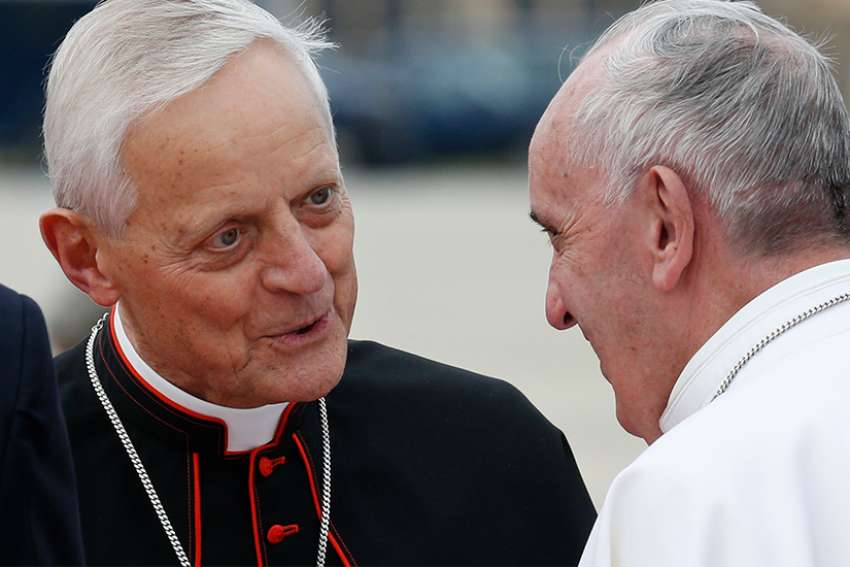Wuerl had lost the support of his flock with many in his archdiocese calling for his head over his alleged role in the sexual abuse coverup in Pennsylvania and with questions related to his predecessor, former cardinal and Washington archbishop Theodore McCarrick.
Before his resignation, a man stood in church and shouted “Shame on you!” as Wuerl spoke from the pulpit during Mass and a woman stood and turned her back on the cardinal in silent protest. There were other examples of anger from Washington parishioners.
Wuerl’s exact role in these coverups is up for debate. Indeed, until recently, Wuerl had a reputation as one of the more aggressive American bishops in supporting and implementing a “zero tolerance” policy against clerical abuse.
But a scathing Pennsylvania grand jury report issued in August about priests molesting children over decades accuses Wuerl of helping protect some of the criminal priests while he was bishop of Pittsburgh. And though Wuerl denies knowing anything about McCarrick’s alleged sexual misconduct, is that really plausible?
While accepting the resignation, the Pope praised Wuerl in a public letter: “You have sufficient elements to ‘justify’ your actions and distinguish between what it means to cover up crimes or not to deal with problems, and to commit some mistakes. However, your nobility has led you not to choose this way of defense. Of this, I am proud and thank you.”
Don’t get me wrong, innocent until proven guilty is a good principle. The grand jury did not convict Wuerl, merely accuse. But surely such effusive praise from the Holy Father is unnecessary. The praise has both upset and enraged some abuse survivors.
“For Pope Francis to praise Cardinal Wuerl and to call him a ‘shepherd’ is insulting to all victims of clergy abuse and especially to those who may have been harmed under his watch. What shepherd places the most vulnerable of his flock in harm’s way?” said Becky Ianni, a Washington-area leader of the Survivors Network of those Abused by Priests (SNAP).
“The Pope calls these actions ‘some mistakes.’ This is another knife in the heart of those who have already suffered at the hands of the Catholic Church. If the Pope truly wants to protect children and help victims to heal he needs to fire and publicly admonish any bishop that has enabled perpetrators by concealing their crimes from law enforcement and the public,” Ianni said in a statement.
Beyond praise, the pontiff also asked Wuerl to remain as the archdiocese’s apostolic administrator — or interim manager — until a successor is found. Wuerl, 78 next month, will remain a cardinal and he’ll continue with his influential role on the Congregation of Bishops, which advises who will get leadership roles in the Church.
So, while Francis accepted his resignation as head of the Washington archdiocese, the cardinal will maintain a persuasive behind-the-scenes role.
This is where it gets tricky.
The Pope has promised more transparency and accountability in the wake of these abuse scandals. But is the handling of the Wuerl case in line with promises of transparency and accountability?
The Holy Father is walking a fine line. On one side are Catholics emptying the pews and feeling betrayed by Church leadership, and on the other end are those opposing meaningful Church reforms.
By many accounts, Wuerl is a decent and holy man — on all files except the latest sex abuse scandals. Over the past few months, he has expressed profound sadness, apologies and contrition. But that has not been enough to many abuse survivors and their families.
Again, innocent until proven guilty, but that applies to court and ultimately imprisonment. Many politicians — and make no mistake, Church leaders like Wuerl are also politicians — have lost more with less evidence.
At a press conference following the Wuerl resignation, Pennsylvania Attorney General Josh Shapiro expressed disappointment. “He is now able to retire seemingly with no consequences for his actions,” Shapiro said.
To be clear, Wuerl was not accused of abuse but was named several times throughout the report for moving priests or not reporting abuse to police. Wuerl has been cited as a key ally for Francis. Conservatives in the U.S. have been wary of him since Pope Francis was elected.
Ironically, in 1986 as a young auxiliary bishop, Wuerl was sent to Seattle to counterbalance the progressive Archbishop Raymond Hunthausen. Conservatives applauded him then, while progressives referred to him as “Rome’s hatchet man.”
With the upcoming February bishops conference in Rome called on by the Pope to find ways to protect children better, Shapiro may have provided foreshadowing: “I think we’ve learned in this process that we can’t rely on the Church to fix itself.”
(Brehl is a writer and author of many books.)


